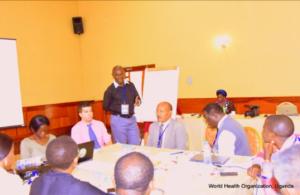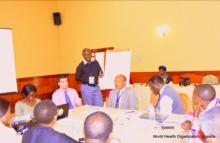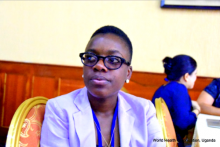Coverage of the African regional workshop on pediatric and adolescent HIV &AIDS (day 2)
Panel on WHO recommendations on Legal and Ethical Considerations
Entebbe, 16 September 2015:- Day two of the workshop focused on sharing country guidelines, opportunities and addressing challenges and solutions faced by the different Sub-Saharan countries in delivering HIV & AIDS treatment and care to children and adolescents.
Dr. Valentina Baltag from the World Health Organization presented the legal and ethical considerations, according to the WHO recommendations, that need to be taken into account when providing HIV & AIDS services for adolescents and children. She highlighted the need to educate health workers on what is expected of them legally and ethically. She cited some of the legal anomalies that pause a challenge when accessing services in different countries; where one is old enough to consent for sex but can’t access contraceptives because of age limit to consent. She also stressed the need to help care takers understand how to apply the rights-based approach to adolescent health care, and train providers in assessing adolescent capacity in autonomous decision making.
A four person panel gave their experience in their countries on the legal and ethical challenges and opportunities. The panel consisted of Dr Lebo Madisha (South Africa), Ms. Loyce Muturu (Zimbabwe) and Florence Naluyinda UNICEF Country Office in Swaziland, Dr Valentina Baltag from the World Health Organization and Dr Anurita Bains (UNICEF) who was the moderator.
Dr Lebo Madisha from South Africa shared the country experience and said the age of consent for HIV testing is now 12 years and older having been taken down from 16 years in 2010. She also said that this decision was taken by South African Government to ensure access to HIV test services in children. She also pointed out that the caregiver definition was redefined to cover child and youth headed households Orphans. She however highlighted the need to take the best interest of the child into consideration, assess the maturity level of the child as well as ensuring that the child understands the social implications of the HIV test when providing these service to them.
Loyce Maturu from Zimbabwe highlighted the inaccessibility of services especially Antiretroviral treatment and sexual reproductive treatment for adolescents. She further pointed out the challenges faced by rural dwellers as they try to access these services in terms of distance and lack of finances. “Some are required to pay ,monthly administrative fees when collecting ARVs, which is unaffordable for some”, she said.
She also mentioned the poor attitude from health workers towards HIV positive adolescents. Ms. Loyce said that stigma and gender based violence would not go without mention as one of the major challenges faced by adolescents living with HIV.
Dr. Florence Naluyinda from UNICEF in the Kingdom of Swaziland highlighted the need to sensitize the people on the different health acts. She said that these acts are often misinterpreted by health workers which in turn affects the way they give services to adolescents. She also pointed out the prevailing various forms of violence that affects adolescents especially those who are HIV positive. Related to the above, she pointed out that FHI a USAID project had translated the acts into local language of Swaziland for the layman to understand. The age of consent to HIV Testing and Counselling (HTC) in Swaziland is 12 years, she however stressed the need for psychosocial support from families to the infected adolescents. She also called for a need to harmonize between legal fraternity and the health fraternity in addressing issues of reproductive health to avoid clashing.
Dr. Valentina called on countries to seek guidance from the WHO recommendations when enacting laws to govern health workers and access to treatment of HIV & AIDS in adolescents.
Dr. Buhle Ncube (WHO) focused her presentation on Identifying HIV infected adolescents; challenges and innovations. She stressed the need to provide a conducive environments for adolescents to test for HIV and seek treatment. She also said that health workers ought to be respectful to the patients that seek HIV & AIDS services, and further provide counselling and guidance to them highlighting the WHO Recommendation on HIV testing and counselling which calls for linkage between HIV testing and counseling to prevention treatment and care is for adolescents from key populations in all settings. Dr. Buhle however decried the issue of HIV stigma and discrimination and stressed the need to address them.
Country Implementation experience on best practices
Dr. Eleonor Magongo presented Uganda’s revised policy guidelines on ART dissemination; starting, monitoring and sequencing treatment. She said that the Ministry of Health conducted various trainings in which health workers were trained on how to provide ART treatment to adolescents and children.
Dr. Zikomo Kwambiri presented the pediatric antiretroviral formulary optimization highlighting the high reductions of babies born with HIV in Malawi at 67%. He also said that increased effort by government and reprogramming has helped attain this figure. He pointed out that procurement has increased supply and availability of medicines.
Day three of the workshop will focus on Delivering services throughout the continuum of care, Community Engagement and Participation and Strategic Information.
_________________________________________________
For more information:
Mwebembezi Edmond, Public Information Officer, Tel.: +256 414 335569, Cell.: +256 782 962674, Email:mwebembezie [at] who.int (mwebembezie[at]who[dot]int)






